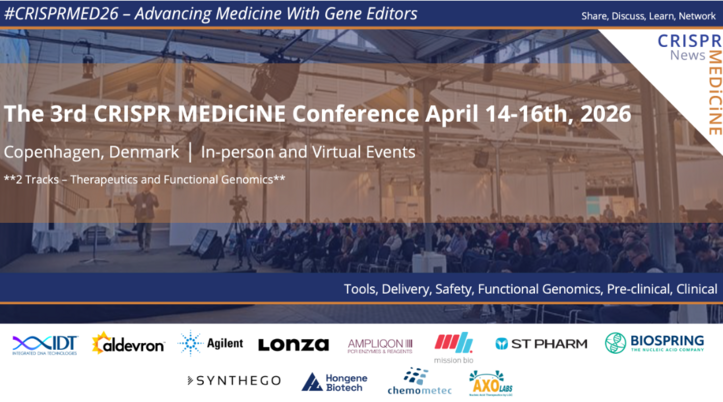Clinical Trial Updates From the Gene-Editing Field - March 2024
Allogeneic CAR-T therapy candidate for multiple myeloma gains orphan drug status
Poseida Therapeutics announced earlier this month that the FDA has granted Orphan Drug Designation to P-BCMA-ALLO1 for the treatment of multiple myeloma (MM).
P-BCMA-ALLO1 is a fully allogeneic, T stem cell memory (TSCM)-rich CAR-T candidate that is engineered to target the B cell maturation antigen (BCMA). This antigen is primarily expressed by malignant and normal plasma cells and by some mature B cells, and is the most widely studied target in CAR-T-based approaches to MM.
Poseida is investigating the safety and efficacy of P-BCMA-ALLO1 in a Phase 1 trial in adults with relapsed or refractory MM, in partnership with Roche. The two-part study, which is ongoing at multiple clinical sites in the US, includes a dose-escalation portion followed by administration at fixed doses.
Clinical data revealed at the American Society of Hematology Annual Meeting in December 2023 showed early positive signs of safety and efficacy in heavily pre-treated MM patients, following suitable lympodepletion therapy. This data also showed that allogeneic TSCM-rich CAR-T cells trafficked to bone marrow and differentiated to cell-killing effector T cells that persisted for at least 6 weeks.
Poseida is expected to present new clinical data on a subset of recently enrolled patients that did not respond to prior BCMA-targeting therapy in a poster presentation at the upcoming American Association for Cancer Research Annual Meeting, to be held in April 2024. In its press release, Poseida Therapeutics also stated that it plans to share additional clinical data from the P-BCMA-ALLO1 programme in the second half of this year, subject to coordination with Roche.
P-BCMA-ALLO1 is developed using Poseida’s proprietary piggyBac® DNA Modification System and the hybrid Cas-CLOVER™ Site-Specific Gene Editing System. You can read much more about piggyBac, Cas-CLOVER and the mechanism of action of P-BCMA-ALLO1 in an interview with former CEO of Poseida Therapeutics, Dr. Eric Ostertag.
Orphan Drug Designation
The FDA's Orphan Drug Designation programme provides orphan status to drugs that are defined as being intended for the treatment, diagnosis or prevention of rare diseases that affect fewer than 200,000 people in the U.S. The designation qualifies the sponsor of the drug for certain development incentives that may include tax credits for qualified clinical testing, waivering of prescription drug user fees, or seven-year marketing exclusivity upon FDA marketing authorisation approval.
Intellia doses first patient in Phase 3 CRISPR trial for transthyretin amyloidosis
Intellia Therapeutics announced last week that the first patient has been dosed in the global, pivotal, Phase 3 MAGNITUTE trial of NTLA-2001 in transthyretin amyloidosis with cardiomyopathy. NTLA-2001 is jointly developed by Intellia Therapeutics and Regeneron and was the first in vivo CRISPR therapy to be administered to humans via the bloodstream. It is designed to be a single-dose curative treatment for transthyretin amyloidosis by selectively reducing the levels of mutated TTR protein in the blood, through CRISPR-Cas9-based inactivation of the TTR gene in liver cells.
Transthyretin amyloidosis (ATTR) is a rare, progressive disease, in which a protein known as TTR becomes misfolded and accumulates as plaques in tissues throughout the body. This causes serious complications that mainly involve the heart and nerves, and most patients die 2-15 years after disease onset. ATTR occurs in a heritable form (ATTRv) and an acquired form (ATTRwt) that may occur with elevated age (ATTRwt). The exact prevalance of ATTR is unknown but ATTRv amyloidosis is estimated to affect 50,000 people worldwide.
The pivotal MAGNITUTE trial is a randomised, double-blind, placebo-controlled study designed to evaluate the safety and efficacy of NTLA-2001 in approximately 765 patients with transthyretin amyloidosis with cardiomyopathy, which occurs as a result of the accumulation of transthyretin fibrils in the myocardium. The trial's primary endpoint is a composite endpoint of cardiovascular (CV)-related mortality and CV-related events. Adult patients with hereditary or wild type ATTR-CM will be randomised 2:1 to receive a single 55 mg infusion of NTLA-2001 or placebo.
In November 2023, Intellia shared interim data from the ongoing Phase 1 trial of NTLA-2001 in an oral presentation at the 4th International ATTR Amyloidosis Meeting, which was held in Madrid, Spain. The Phase 1 trial is a two-part study evaluating NTLA-2001 in patients with either ATTR amyloidosis with cardiomyopathy (ATTR-CM) or hereditary ATTR amyloidosis with polyneuropathy (ATTRv-PN). That data, detailed in a press release published by Intellia in November 2023, revealed consistent, deep and durable reductions in serum TTR levels following a single dose of NTLA-2001, and included 29 patients who had at the time of publication reached 12 months or more of follow-up. NTLA-2001 was reported as being generally well-tolerated across both polyneuropathy and cardiomyopathy arms at all dose levels tested.
iECURE obtains approval to expand rare disease gene-editing trial into the UK
US-based gene-editing company iECURE recently announced approval from the UK Medicines & Healthcare products Regulatory Agency (MHRA) to expand the ongoing OTC-HOPE trial of investigational gene-editing therapy ECUR-506 into the UK.
ECUR-506 is an investigational meganuclease-based in vivo gene-insertion therapy designed to treat ornithine transcarbamylase (OTC) deficiency in infants. The approval to start a trial in the UK follows previous approval to begin the OTC-HOPE study by the Australian Therapeutic Goods Administration (TGA).
Ornithine transcarbamylase deficiency
Ornithine transcarbamylase deficiency (OTCD) is an X-linked inherited metabolic disorder that causes ammonia to accumulate in the blood. OTCD arises as a result of genetic variants in the OTC gene (Xp21.1), which encodes ornithine transcarbamylase, a liver enzyme responsible for the detoxification of ammonia. The consequential build-up of excess levels of ammonia in the blood can lead to severe disease symptoms such as cumulative and irreversible neurological damage, coma and death. The severe form of OTCD, also referred to as the neonatal-onset form, is detectable just a few days after birth and is more common in boys than girls. The prevalence of OTC deficiency is estimated to range from 1 in 14,000 to 1 in 77,000 people. The disease is incurable and treatment, which is is aimed at symptom control, includes a combination of dietary restrictions and medications to stimulate the removal of nitrogen from the body, and requires a multidisclipinary team of professionals. In most severe cases, a liver transplant may offer the only hope of survival.
ECUR-506 is the first ever clinical meganuclease-based in vivo gene insertion programme, and it is being developed using the ARCUS meganuclease technology under licence from Precision BioSciences. ECUR-506 relies on the delivery of two adeno-associated virus (AAV) capsids, each carrying different payloads. ECUR-506 comprises two vectors, an ARCUS® nuclease vector targeting gene editing in the well-characterised PCSK9 gene locus and a donor vector that inserts the desired functional OTC gene. The cut in the PCSK9 site serves as the insertion site for the OTC gene, providing a potential path to permanent expression of a healthy gene.
The OTC-HOPE study is a Phase 1/2 first-in-human study in newborn boys with genetically confirmed neonatal onset OTC deficiency. The study's primary objective is to assess the safety and tolerability of up to two dose levels of ECUR-506 following intravenous administration of a single dose. Secondary objectives are to assess the pharmacokinetics and efficacy of ECUR-506. In addition, exploratory endpoints will assess disease-specific biologic markers, developmental milestones and quality of life.
We will provide updates on the studies discussed in this article as they emerge. For a complete overview of clinical trial approvals and updates, check out CRISPR Medicine News' Clinical Trials Database.
To get more CRISPR Medicine News delivered to your inbox, sign up to the free weekly CMN Newsletter here.
Tags
ArticleNewsClinical News UpdatesCancerMultiple Myeloma, MMOrnithine transcarbamylase (OTC) deficiencyTransthyretin amyloidosis, ATTRTransthyretin Cardiac Amyloidosis, TTRCAR-TCas-CLOVERCRISPR-CasMeganucleasespiggyBaciECUREIntellia Therapeutics, Inc.Poseida TherapeuticsPrecision BioSciences, Inc.Regeneron Pharmaceuticals, Inc.
CLINICAL TRIALS
Sponsors:
Suzhou Maximum Bio-tech Co., Ltd.
Sponsors:
Zhejiang University







